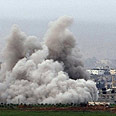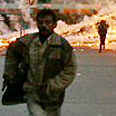
Israeli airstrike during January offensive
Photo: AFP

Gazan fleeing home during Cast Lead
Photo: AFP

School bombed in Jabaliya
Photo: AP
IDF to give better warnings before attacks
Over 200,000 phone calls were made during Operation Cast Lead warning Gazan civilians of Israeli airstrikes near their homes. Military decides to take procedure one step further, giving more accurate, more detailed warnings including escape routs for future attacks
The defense establishment has decided to give more accurate details in warnings issued to Palestinians before aerial strikes, in order to help residents of the area to be hit that are not involved in terror activity flee.
Ynet has learned that in hearings held recently on Operation Cast Lead in Gaza, military sources, including representatives from the military prosecution's international law department, agreed that the more specific information, such as more accurate timetables for strikes to be carried out and escape routes, should be given.
Fliers distributed by the IDF from now on will also be more detailed in order to make it clear to civilians that their lives are in danger and give them a chance to flee. It was also determined in the hearing that the military made multiple efforts to prevent civilian casualties in January's offensive.
During Operation Cast Lead, over 200,000 phone calls were made to Palestinian homes in the Gaza Strip, and thousands of fliers were distributed, in order to warn civilians of IDF aerial assaults.
The calls were made as part of the army's procedure to avoid civilian casualties while striking terror organizations' headquarters and cells operating from within or under residential buildings.
The IDF's goal is to destroy terror targets without harming civilians, and sometimes does this by firing shots in the air nearby as a warning. In this way, the military also tries to neutralize Hamas' attempts to protect its activity sites by nesting them in residential areas.
In an effort to maintain this policy and further improve it, the decision was made, and approved by the military's highest ranking officials, to allow Palestinians to receive more accurate information on upcoming strikes.
This improved protocol should help Palestinians not involved in terror, but is also in the interest of the military, in light of the harsh waves of international criticism against its actions in the Strip and threats to open international legal proceeds for alleged war crimes.















